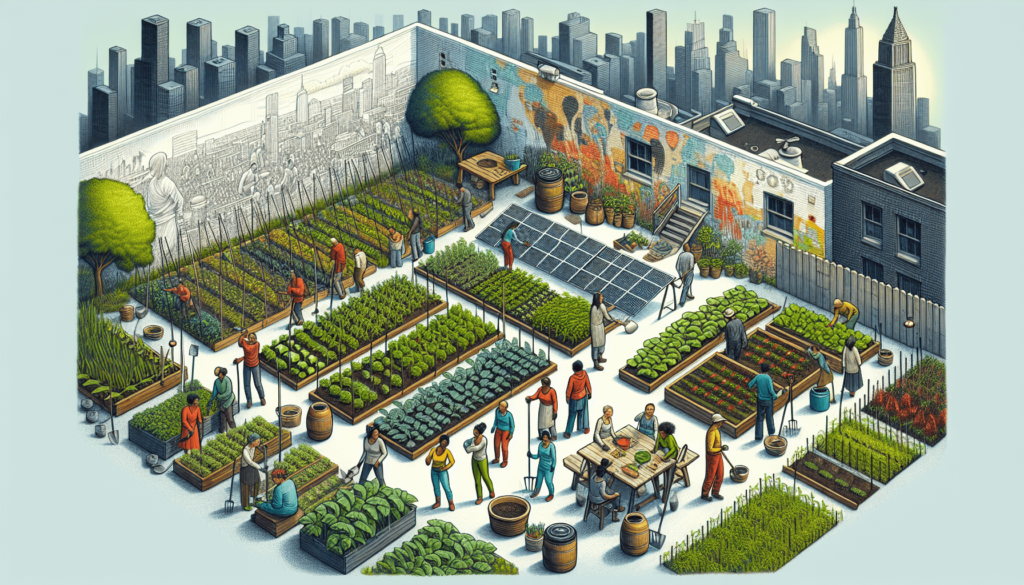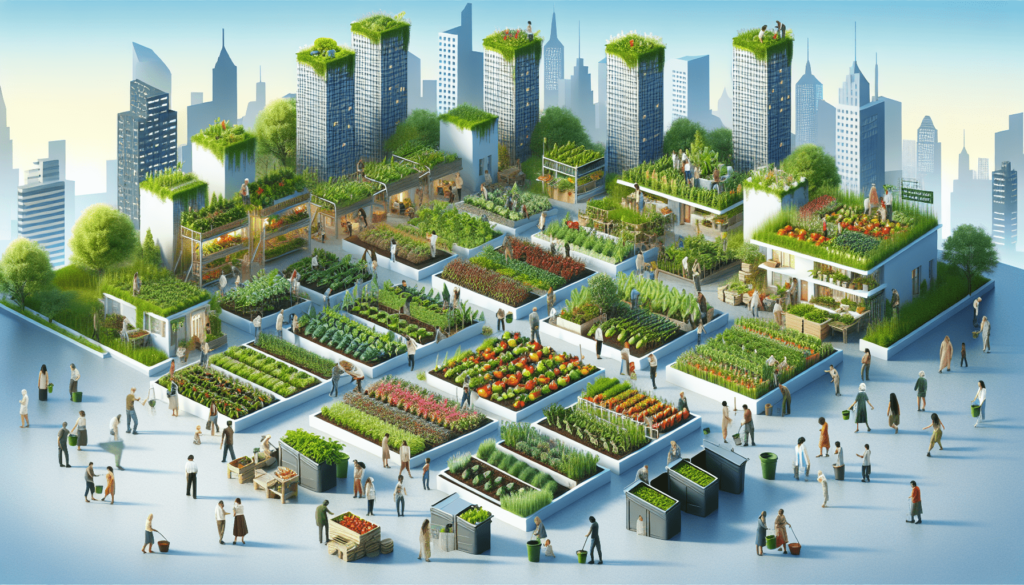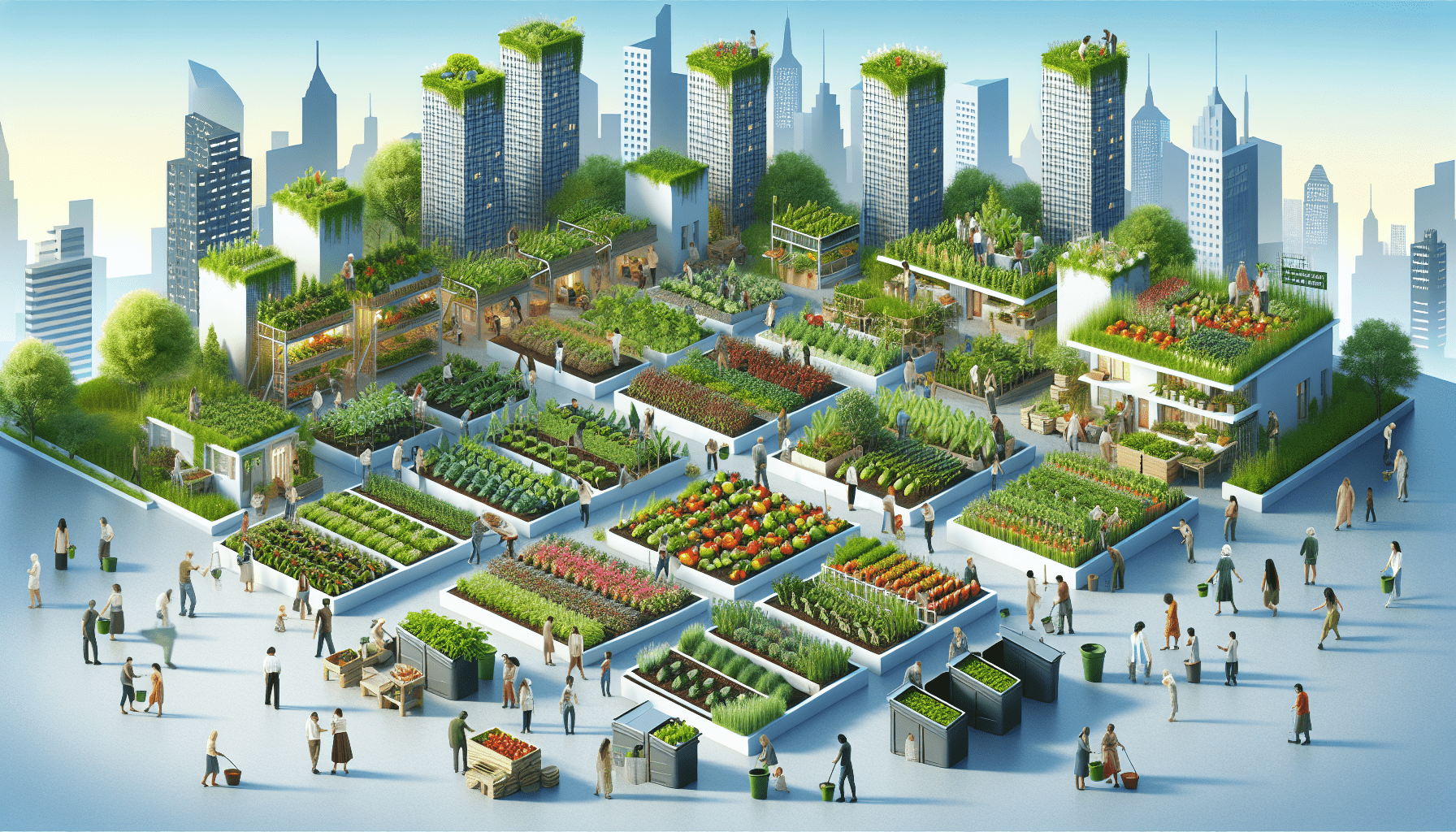Imagine a neighborhood where vibrant green spaces replace concrete jungles, where the scent of fresh herbs and vegetables fills the air, and where the community comes together to cultivate their own sustenance. Urban gardens have emerged as a powerful solution to address the pressing issue of food security in our cities. These pockets of green not only provide a source of nutritious food but also foster a sense of belonging, promote environmental sustainability, and empower individuals to take control of their own well-being. In this article, we will explore the invaluable role that urban gardens play in ensuring food security, ultimately transforming our urban landscapes into thriving hubs of self-sufficiency and community resilience.

Definition of Urban Gardens
Urban gardens are small-scale agricultural spaces created within urban environments. These gardens are designed to maximize the use of limited space in densely populated cities and provide local communities with access to fresh and nutritious food. Urban gardens come in various forms, such as rooftop gardens, community gardens, vertical gardens, and container gardens, each with its unique characteristics and advantages. These gardens play a vital role in addressing the challenges of food security and have numerous benefits for the environment, health, and social well-being.
Types of Urban Gardens
Rooftop gardens
Rooftop gardens utilize the often-unused space on the roofs of buildings to grow a wide range of fruits, vegetables, and herbs. These gardens provide a unique opportunity to utilize vertical space in cities and create green oases in urban areas. Rooftop gardens can help to reduce the heat island effect, improve air quality, and provide insulation for buildings. They also reduce stormwater runoff and contribute to biodiversity in the city.
Community gardens
Community gardens are shared spaces where residents come together to grow food collectively. These gardens foster a sense of community, allowing people to connect with their neighbors and work together towards a common goal. Community gardens often serve as educational spaces, where individuals can learn about gardening, sustainable practices, and healthy eating. They also provide a platform for intergenerational learning and cultural exchange, enriching the social fabric of a neighborhood.
Vertical gardens
Vertical gardens, also known as green walls, are cultivated on vertical surfaces, such as the walls of buildings or fences. These gardens maximize space efficiency and can be implemented in areas with limited ground space. Vertical gardens not only beautify urban landscapes but also provide insulation, soundproofing, and air purification benefits. They enhance biodiversity by creating habitats for insects and birds and contribute to overall urban greening efforts.
Container gardens
Container gardens involve growing plants in portable containers, such as pots, planters, or raised beds. They are particularly suitable for those living in apartments or houses with limited outdoor space. Container gardens offer versatility, as they can be moved around to optimize sunlight exposure and are not limited to specific locations. They allow individuals to cultivate a wide range of fruits, vegetables, and herbs, providing them with a sense of self-sufficiency and the pleasure of gardening even in urban settings.
Benefits of Urban Gardens
Improved food security
One of the significant benefits of urban gardens is improved food security. Food security refers to the reliable access to sufficient, safe, and nutritious food for an active and healthy life. Urban gardens contribute to food security by providing communities with a local source of fresh produce, reducing their dependence on often distant and unreliable food supply chains. By growing food within the city, urban gardens help ensure that residents have access to nutritious food and are less vulnerable to disruptions caused by natural disasters or other crises.
Environmental benefits
Urban gardens offer numerous environmental benefits. They contribute to urban greening efforts, increasing biodiversity and enhancing the overall aesthetics of the city. These gardens help to mitigate the heat island effect by providing shade and reducing surface temperatures. Through the process of photosynthesis, plants absorb carbon dioxide, making urban gardens effective in mitigating climate change. Additionally, urban gardens help manage stormwater runoff, reducing the strain on urban drainage systems and minimizing the risk of flooding.
Health benefits
Engaging in urban gardening activities has positive impacts on physical and mental health. Gardening is a low-impact form of exercise that promotes physical activity and helps individuals maintain a healthy lifestyle. Growing and consuming fresh produce from urban gardens also contribute to a nutritious diet, reducing the risk of chronic diseases such as obesity, diabetes, and heart disease. Moreover, the act of gardening itself has therapeutic effects, reducing stress, improving mood, and enhancing overall well-being.
Social and community benefits
Urban gardens serve as important spaces for community engagement and empowerment. They provide opportunities for people from diverse backgrounds to come together, build relationships, and share knowledge and resources. By fostering a sense of ownership and responsibility, urban gardens empower individuals and communities to take control of their food production and consumption. Furthermore, community gardens often engage in educational initiatives, teaching gardening skills and sustainable practices, and promoting healthy eating habits. These efforts play a crucial role in raising awareness about food systems and creating a more sustainable and resilient urban environment.
Promoting Urban Gardens
To harness the full potential of urban gardens, various factors need to be considered in promoting and supporting their establishment and development.
Policy support
Governments and local authorities play a critical role in promoting urban gardens by implementing supportive policies and regulations. These policies can include incentives for building owners to incorporate rooftop gardens, allocating land for community gardens, and supporting the use of public spaces for urban farming. By creating an enabling environment, policymakers can encourage the growth of urban gardens and facilitate their integration into city planning and development strategies.
Education and awareness
Raising awareness about the benefits and possibilities of urban gardens is essential to promote their adoption. Educational programs can be implemented to teach individuals, particularly children and youth, about gardening techniques, sustainable practices, and healthy eating habits. Schools, community centers, and other institutions can organize workshops, training sessions, and events to engage and educate the community about urban gardening and its positive impacts on food security, health, and the environment.
Access to resources and funding
Access to resources, such as land, water, and gardening supplies, is crucial for the successful establishment and maintenance of urban gardens. Governments, non-profit organizations, and private entities can provide funding, grants, or loans to support the establishment of community gardens and assist individuals in starting their own urban gardens. Additionally, initiatives can be undertaken to provide technical assistance, training, and mentorship to aspiring urban gardeners, ensuring their success and sustainability.

Case Studies: Successful Urban Gardens
Brooklyn Grange in New York City
Brooklyn Grange is one of the largest rooftop farming ventures in the United States, operating multiple rooftop farms across New York City. Covering an area of over two acres, these farms produce a variety of vegetables, herbs, and fruits, contributing to the local food supply. Brooklyn Grange offers educational programs, workshops, and events to engage the community and raise awareness about urban farming and sustainable agriculture practices. The organization’s success demonstrates the potential of rooftop farming in addressing food security and promoting environmental sustainability in urban settings.
The Rooftop Gardens Project in Singapore
Singapore, a city-state with limited land availability, has embraced the concept of urban gardening to enhance food security and promote sustainable urban development. The Rooftop Gardens Project, initiated by the government, promotes the adoption of rooftop gardens in residential and commercial buildings. Through incentives and technical support, the project encourages building owners to transform their rooftops into productive green spaces. These rooftop gardens not only produce fresh food but also provide a visual respite from the concrete jungle and contribute to Singapore’s vision of becoming a City in a Garden.
The Vertical Farming Initiative in Sweden
Sweden, known for its innovative approach to sustainability, has embraced vertical farming as a solution to food security challenges in urban areas. The Vertical Farming Initiative, led by a team of researchers and entrepreneurs, explores the potential of vertical farming techniques to produce food in controlled environments using minimal resources. These vertical farms utilize hydroponics and artificial lighting to grow crops efficiently, reducing the need for traditional agricultural inputs such as water and land while maximizing crop yields. The initiative demonstrates how urban farming can be taken to new heights, quite literally, to ensure food security in densely populated cities.
Conclusion
Urban gardens play a significant role in promoting food security, improving the environment, enhancing health outcomes, and fostering social cohesion in urban areas. Through their varied forms, such as rooftop gardens, community gardens, vertical gardens, and container gardens, these spaces enable localized food production, increased access to fresh produce, community engagement, and empowerment, and resilience to climate change. To unlock the full potential of urban gardens, policy support, education and awareness, and access to resources and funding are essential. By championing urban gardening initiatives, individuals, communities, and governments can contribute to a more sustainable, resilient, and inclusive urban future. It is our collective responsibility to recognize the importance of urban gardens for food security and take action to promote and support their establishment and growth. Together, we can cultivate a greener, healthier, and more sustainable world. So, let’s get our hands dirty and start paving the way for a thriving urban garden movement!

